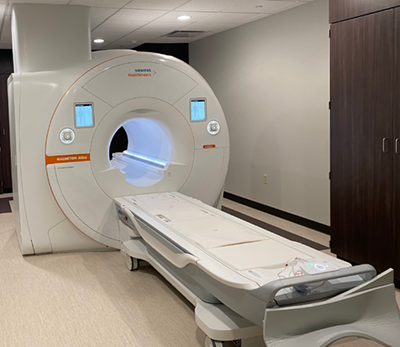Abbreviated Breast MRI at Witham
If you have dense breasts, Abbreviated Breast MRI Screening may be a good choice for you

Abbreviated Breast MRI Screening is a low-cost, shortened version of the standard Breast MRI exam. It has been developed specifically for screening women with dense breasts. Witham Health Services offers Abbreviated Breast MRI Screening in Lebanon and Whitestown at Anson.
If you have dense breasts, Abbreviated MRI Screening may be a good choice for you
Breast tissue is composed of fibrous, glandular and fatty tissue. Dense breasts have much more fibrous and glandular tissue compared to fatty tissue. About 50% of women have dense breast tissue.
Dense breast tissue makes it more difficult to find cancer on a mammogram by hiding an early cancer when it has the best chance for cure. Depending on how dense your tissue is, dense breast tissue may increase your risk of breast cancer.
Breast MRI has been recommended for many years as an additional screening exam for women at elevated risk for developing breast cancer.
If you have dense breasts, please talk to your health care provider about Abbreviated Breast MRI. Together, you can decide if this additional screening is right for you.
Witham offers Abbreviated Breast MRI Screening in two convenient locations
Call 765-485-8080 to schedule.
|
Witham Imaging Services - Lebanon |
Witham Imaging Services - Whitestown at Anson |
Breast MRI is the most accurate supplemental imaging
Abbreviated Breast MRI Screening does not involve radiation or breast compression, but has the same accuracy as the standard Breast MRI exam when used for screening.
Abbreviated Breast MRI is not a replacement for regular mammograms, but studies have shown that supplemental imaging can find cancers that cannot be seen on a mammogram.
What about false positive results?
No breast cancer screening test is perfect. There will be times when something is found that requires further testing, including mammography, ultrasound, and even a possible needle biopsy, to determine if there is truly a cancer present. If it turns out that no cancer is present, it’s called a false positive.
Fortunately, when read by expert breast imaging radiologists, the false-positive rate for Abbreviated Breast MRI Screening is relatively low and similar to mammograms.
What is the cost?
Most insurance companies do not yet cover Abbreviated Breast MRI Screening for women who have dense breasts. Witham’s self pay price is $299.

Ideal candidates for Abbreviated Breast MRI Screening are at least 40 years old and have had a mammogram in the last 12 months
Candidates must have a physician’s order. They must also have dense breast tissue and be asymptomatic with no breast problems, such as a lump, pain, nipple discharge, etc.
Routine screening Breast MRI (instead of Abbreviated Breast MRI) is recommended for high-risk patients who have a calculated lifetime risk of breast cancer of 20% or greater or a genetic predisposition.
You cannot be examined by MRI if you have any of the following:
- Pacemaker
- Aneurysm clips in the brain (some are compatible with MRI)
- Inner ear implants
- Metal fragments in an eye
- Implanted spinal cord stimulator
Witham’s friendly and caring team will help you prepare for and guide you through the exam
Prior to your Abbreviated Breast MRI you may eat and take your medications as you normally would.
We’ll ask you questions before you enter the MRI exam room to confirm that you don’t have any metal in or on your body, including metal implants, a cardiac pacemaker, or other metal objects. You’ll have to remove all metallic objects, such as jewelry, glasses, hairpins, hearing aids and dentures.
During the exam, you will lie on your stomach with your breast placed in openings in the examination table, so that they’re suspended away from your chest. You’ll enter the machine feet-first. A small intravenous catheter will be placed, usually in the arm. An initial scan will be taken and then repeated after the IV injection of a contrast enhancement agent called gadolinium. The gadolinium helps to highlight various structures in the breast tissue.
For best results, you should lie very still, relaxed, and breathe normally. The entire exam takes about 45 minutes to an hour.